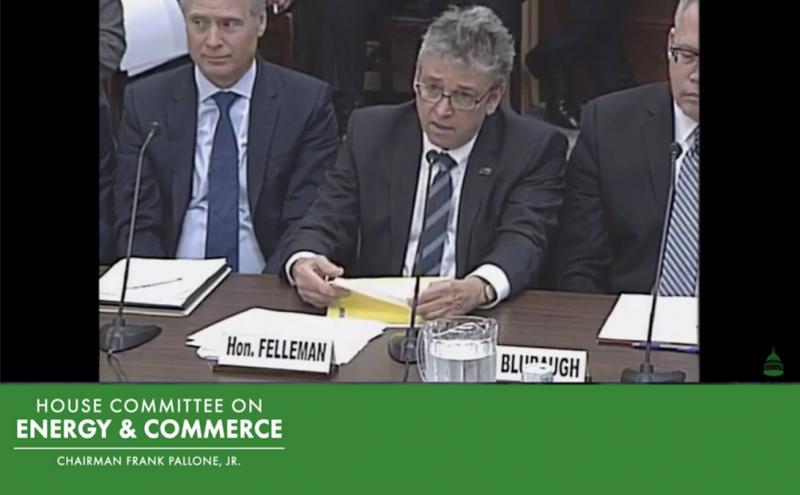
On October 23, Commissioner Fred Felleman represented the Port of Seattle and Northwest Seaport Alliance in testimony before the U.S. House Committee on Energy and Commerce Subcommittee on Environment and Climate Change. The hearing, “Building a 100 Percent Clean Economy: Solutions for Planes, Trains and Everything Beyond Automobiles,” is the fourth hearing in a series of climate change hearings. Commissioner Felleman is the Founding Chair of the Port of Seattle Energy and Sustainability Committee.
"Good morning, Chairman Tonko, Ranking Member Shimkus and members of the subcommittee. I’m Fred Felleman, Port of Seattle Commission Vice President and Managing Member of The Northwest Seaport Alliance.
The Port of Seattle’s diverse business lines include, managing commercial fishing and cruise terminals as well as the Seattle-Tacoma International Airport. In partnership with the port of Tacoma, we also jointly manage the fourth largest container port complex in North America.
We’re committed to carrying out our mission in an environmentally sustainable manner, while recognizing the needs of disproportionately impacted communities. As founding chair of the Port’s Energy and Sustainability Committee, I look forward to this opportunity to share the progress we’ve achieved voluntarily and identify opportunities to collaborate in the future.
In Washington state we’re very fortunate to have a “green grid,” powered primarily by hydroelectricity. In addition, we’ve made significant investments in wind and solar projects creating additional renewable energy and jobs in the districts of representatives Walden and McMorris Rodgers.
The aviation and maritime sectors are particularly difficult to decarbonize.
According to the International Air Transport Association and International Maritime Organization, air transport and maritime shipping each account for about two percent of the global CO2 emissions and will continue to grow unless action is taken.
Nonetheless, the Port of Seattle has a goal of being the greenest and most energy efficient port in the nation.
At Sea-Tac Airport, we’re providing pre-conditioned air and electricity to power aircraft while they’re at the gate, reducing Greenhouse Gas emissions by more than 40,000 metric tons. We’re also installing charging stations on our airfield to support ground handling equipment.
Off-airfield, we’re transitioning our bus fleet and central heating plant to renewable natural gas. Our taxi and ride-sharing services are required to meet strict fuel economy standards, and we’re providing electric vehicle charging stations to the public. Our longer-term goal is to fuel every flight at Sea-Tac with a 10 percent blend of biofuel by 2028.
Sustainable Aviation fuels have a lifecycle carbon footprint 80 percent lower than current jet fuel.
For the maritime sector, the Port of Seattle was one of the first ports in the country to install shore power at a marine terminal, enabling cruise ships to turn off their engines while at berth utilizing our low carbon electrical grid.
Plugging container ships into shore power at the Northwest Seaport Alliance’s major terminals, would also result in emission reductions of nearly 14,000 tons of Greenhouse Gas annually. Connecting all our cruise ships to shore power would have saved over 10,000 metric tons last year alone.
The Ports of Seattle and Tacoma also require that all cargo trucks entering Seaport Alliance international container terminals are at least 2007.
At the Port of Tacoma, they’re nearing completion of an LNG terminal to serve maritime vessels. Additionally, the state’s ferry service is transitioning to electrification.
Moving forward, our primary strategy is to electrify marine terminals and convert diesel-powered drayage trucks and cargo-handling equipment to electricity or other clean energy sources.
The job ahead of us is daunting. Maritime and aviation transportation systems and global supply chains are complex, and a port’s authority to manage them is limited. Funding is a huge obstacle to faster implementation, and we must also carefully balance our environmental priorities alongside our economic and social responsibilities.
Support from the federal government is needed to help us overcome these challenges to meet our carbon emission targets.
We ask that Congress:
- Support the transition to sustainable aviation fuels through funding, research and interagency partnerships
- Support electrification for marine terminals and other clean energy solutions for maritime operations
- Increase funding and expand program eligibility for environmental elements of projects that reduce emissions
- And harmonize federal and global efforts to decarbonize oceangoing vessels while at sea
Climate change is already impacting our abilities to operate our core businesses reliably and predictably. But this is also creating opportunities for innovation and job creation.
Our ports are supporting the State of Washington’s Maritime Blue initiative to drive innovation and advance clean maritime technologies. Creating jobs of the future will enable our region to capture a growing portion of the global maritime “blue” economy that is expected to reach $3 trillion by 2030.
Similarly, by supporting the development of sustainable aviation fuels, there will be broad based benefits for research institutions, refineries, farmers, foresters, and feedstock producers.
Thank you again for the opportunity to join you today. Decarbonization of the maritime sector is a big, bold and essential goal. The Port of Seattle and the Northwest Seaport Alliance look forward to working with Congress to achieve this goal.
Thank you."


